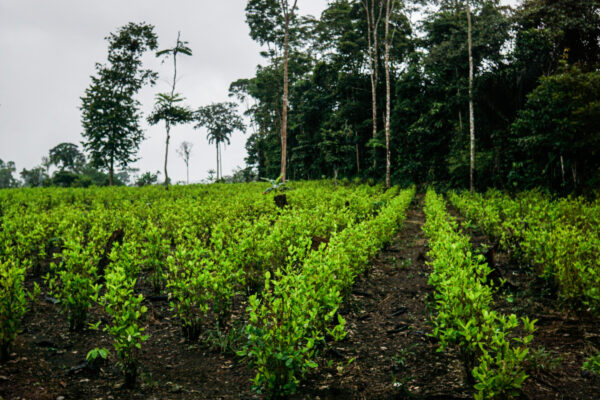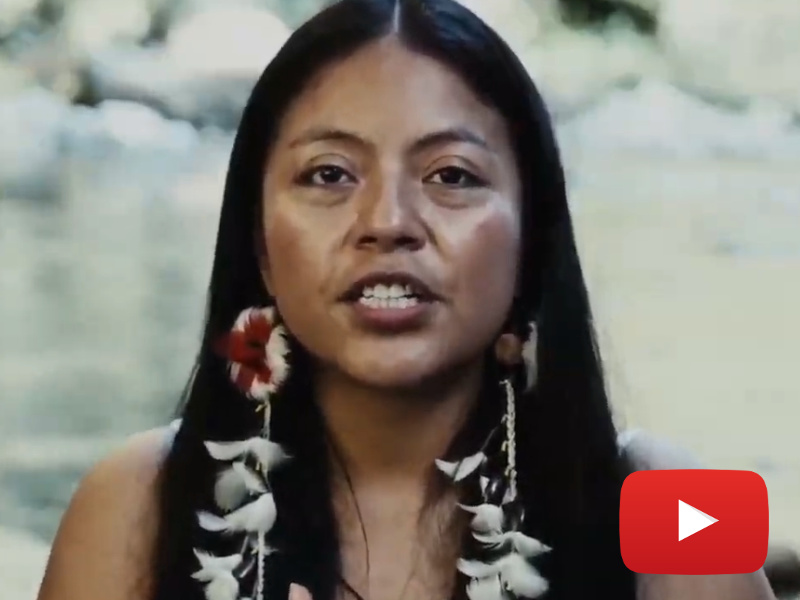The military patch depicted here is worn on the right shoulder of every soldier that protects oil installations in Colombia. The drilling rig and the soldier represent the story of oil development in Colombia with chilling accuracy. The U’wa, an indigenous community of 5000 people, do not want to be part of the cycle of violence that oil development brings. But as oil companies and the government increase pressure on the U’wa, more soldiers wearing this patch are appearing on their lands.
Four hundred years ago, according to U’wa oral histories, a portion of the tribe committed mass ritual suicide rather than surrender to the Conquistadores. Recently, the U’wa have threatened to repeat that ultimate protest if oil development is allowed to go forward on their land. Over the last decade, the U’wa have watched while the pipeline that runs just north of their reservation has been bombed over 500 times by leftist guerrillas. Over one and half million barrels of crude oil have spilled onto land that borders their sacred home. The U’wa have watched as their oil-rich neighboring territories have become centers of human rights abuses – perpetrated mostly by pro-government paramilitaries. To anyone who is watching, and particularly to the U’wa, the message is clear: Oil equals violence.
In April of 1992, Los-Angeles based Occidental Petroleum was granted exploration rights to much of the traditional U’wa territory, known to the oil industry as the SamorŽ block. Occidental (the operator of the consortium) and Shell each held a 37.5% share, while Ecopetrol, the Colombian national oil company, held the remaining 25%. The company estimated that the entire SamorŽ oilfield held 1.5 billion barrels. The SamorŽ field represents billions of dollars in potential profit for Occidental, Shell, and the Colombian government, but it amounts to no more than three months worth of oil for United States’ consumers. An ancient culture, a pristine ecosystem, 5,000 lives – all at risk for three months of a substance that even major oil companies and many of the world’s governments agree we must soon find a way to do without.
The SamorŽ block was once filled with different clans of U’wa and their migratory relatives who called the land “Kajka Ika.”-the Heart of the World. For thousands of years the U’wa lived by seasonally migrating between upland cloudforest and lush valleys, gathering plants and special frogs, hunting and fishing. The past fifty years have been particularly difficult for the U’wa, as they have been forced to suffer through Colombia’s many wars and the resultant displacement, colonization, and exposure to foreign diseases, which decimated their population.
When Occidental obtained its environmental license from the Ministry of the Environment in February of 1995 the perceived financial interests of Occidental, Shell, and the Colombian government were pitted against the human and environmental rights of the surviving U’wa. The U’wa leadership responded by stating their “life or death” bottom line and a stalemate quickly ensued. Occidental could not proceed until it had broken the U’wa resistance-the U’wa meanwhile would not budge. Early this year Shell began looking for a way out of the project and U’wa strength kept growing as did support for their heroic stance.
In May of 1998 a Bogota newspaper broke the story that Occidental was renegotiating their contract, and giving up their drilling “rights” to least three quarters of the SamorŽ block. Occidental public relations officers immediately spun this as a solution to the impasse-announcing that they were renouncing their claim to all “land claimed by the U’wa”, and that their new proposed drill site lay “outside the disputed area.”. Typically, neither Oxy nor the government had consulted the U’wa about this new “solution”. If they had, they would have learned that the U’wa consider all of the Samore block (and more) to be their sacred homeland.
Although the crisis remains unresolved, one thing is clear. The U’wa are doing something right.
It is almost unheard of for a multinational corporation and a debt-ridden, resource-dependent national government to back down under pressure from an indigenous community. Many struggles between indigenous groups and mining and oil corporations have led to international notoriety for a while, and in some cases marginal improvements have been made on the ground. But rarely has a multinational corporation announced that it would avoid an area due to indigenous sovereignty claims.
What makes the U’wa different? Some important factors are the strength of Colombian indigenous sovereignty laws; the strength of the international legal case filed by the U’wa; the press interest in an easily sensationalized story; the ongoing civil war in Colombia; and the persistence of both the national and international campaign. All of these would amount to little however, if they were not founded on an unswerving, courageous stance of resistance by the leaders of the U’wa community.
From the beginning, the U’wa have distinguished themselves by simply saying no to the proposed development on their lands. Facing the wealth and power of two multinational oil companies and the weight of the Colombian government, they have refused to negotiate without first having their fundamental rights guaranteed. They have refused to cut deals because they remember how easily the Riowa (outsiders) break promises. They have defended their land, their people, their culture, their rights and thus their future.
This report is the result of field research conducted primarily in March of 1998 into the struggle of the U’wa with Occidental and its partners in Colombia.
This carefully documented report includes:
a background on U’wa history, culture, and relationship to the environment.
evidence of a clear correlation between oil development, violence, and human rights abuses in Colombia.
rebuttal of the myth that oil development is sound development policy the story of how Occidental, paying $20 million annually for “security” contributes to human rights abuse.
details of Occidental’s disregard for the local environment in existing Colombian operations.
a description of the lack of meaningful consultation with the U’wa about the Samore project.
the first map that combines the ancestral U’wa territory with the SamorŽ block.
an update on the legal case as it is being mediated by the Organization of American States.
evidence that Shell’s effort to sell its shares in the SamorŽ project is motivated primarily by public relations concerns.
analysis of what steps can be taken towards resolution of the issues facing the U’wa.
a full chronology of the U’wa struggle
The U’wa are the latest example of an ongoing tragedy that involves us all. First, our collective addiction to oil is driving the demand for oil that is systematically destroying the world’s last pristine ecosystems and devastating the last isolated indigenous cultures. With even major oil companies agreeing that a phase out of fossil fuels will happen in the next century, one has to ask-is it worth it? Known oil reserves hold decades worth of supply for the global economy-must we really destroy these last few untouched places and peoples for a few months more?
Second, many Southern countries such as Colombia continue to believe that they key to their “development” is the full exploitation of their natural resources. Countries like Mexico, Nigeria, Angola, and Zaire prove that conflict, rather than wealth, is the more likely outcome of sudden infusions of mineral money. The U’wa are still threatened. If Occidental starts drilling or if the land they renounced is re-sold to other oil companies it will provoke a crisis. The U’wa may still declare that oil development on any of their ancestral lands is unacceptable . . . or they may not. But it is their choice.
Colombian President-elect Andres Pastrana has a tremendous opportunity in this crisis. A promising peace process between the guerrillas and the government may allow the space for cooler heads to prevail. Human rights may yet triumph over multinational corporate interests. What ever happens it is clear that the only way forward from this crisis involves the fully informed consent of the U’wa-something that is yet to happen. Until it does, the Colombian government, Occidental, and the U’wa, remain at the edge of disaster.












